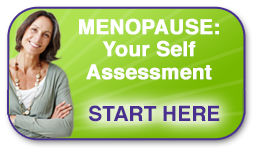Before, During & After
Menopause is the normal, natural transition in life that begins between the ages of 35-55. During this time, your ovaries get smaller and stop producing the hormones estrogen and progesterone that control the menstrual cycle, your eggs are depleted and fertility declines. Eventually, you are no longer able to become pregnant.
Perimenopause/Before
The 3-5 year period before menopause when your estrogen and hormone levels begin to drop is called perimenopause. You typically enter into perimenopause in your late 40's and could begin to experience irregular menstrual cycles and symptoms such as:
- Hot flashes
- Sleep disturbances-insomnia
- Night sweats
- Elevated heart rate
- Mood changes—irritability, depression, anxiety
- Vaginal dryness or discomfort during sexual intercourse
- Urinary issues
There is still a chance that you could get pregnant during this time and if you want to avoid this, a form of birth control is recommended until one year after your last period. A form of progestin therapy may also be an option to control menstrual bleeding and address vasomotor symptoms. Lifestyle changes are often recommended to help relieve other unpleasant symptoms.
Early Menopause
Certain events other than natural aging can result in an earlier menopause:
- Hysterectomy (uterus removed)—symptoms appear gradually
- Oophorectomy (ovaries removed)—symptoms appear immediately
- Premature Ovarian Failure (POF)—underactive or inactive ovaries due to genetics, surgery, or cancer treatments, such as radiation therapy or chemotherapy. POF can also be due to ovarian dysfunction or insufficient follicles, which mature into eggs.
Menopause/During
On average, most women are about 51 to 52 when they enter menopause. Technically, you are in menopause after you've missed your period for 12 straight months without experiencing other causes, such as illness, medication, pregnancy or breastfeeding. The transition from perimenopause through menopause to postmenopause can take 1-3 years. It's important to remember every woman is unique and will experience menopause differently. Some women experience few, if any symptoms, and for those who do, the symptoms can vary widely.
Postmenopause/After
Postmenopause starts after one year has passed since your last menstrual cycle. Other symptoms that might have started in perimenopause can continue through menopause and postmenopause. It's not unusual to experience:
- Hot flashes
- Night sweats
- Elevated heart rate
- Sleep disturbances-insomnia
- Mood changes—irritability, depression, anxiety
- Urinary issues
- Vaginal dryness—which can lead to discomfort during sexual intercourse
Additionally, due to the decrease in estrogen, there's an increased risk of heart disease, osteopenia and osteoporosis.



